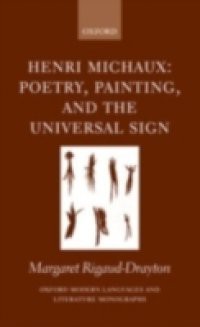Henri Michaux is widely recognized as a major twentieth-century French poet and painter. Although his fascination with universal languages has attracted the attention of several of his critics, it has up until now been treated as a marginal concern. Henri Michaux: Poetry, Painting, and the Universal Sign argues that his ideas on what might constitute a universal language are central to an understanding of his works. It suggests that both his ambivalentarticulation of his relationship to the languages and literary traditions of his native Belgium and adoptive France, and his efforts simultaneously to exacerbate and subvert the differences between words and images, are rooted in Enlightenment theories of the relationship of the self to nature and its languageRigaud-Drayton's study makes a substantial and original contribution to the study of this complex artist, exploring the intricate relationships between word and image in his poetry and paintings, and his quest for a single, unifying language or sign.

